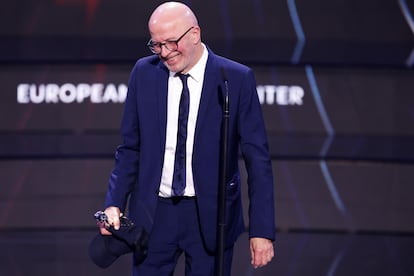There has not been a film like the French one this year Emilia Perez, by Jacques Audiard. And this is what the European Film Academy has considered, which at its 37th awards gala, held in Lucerne (Switzerland), has surrendered to this narco-musical. queer, which won awards for best film, direction, screenplay (when he received this trophy, Audiard joked about changing his last name to Award), actress for Karla Sofía Gascón and editing.
The Madrid-born Karla Sofía Gascón became the third Spanish actress to win the European award for best female performance, after Carmen Maura, who has won it twice, and Penélope Cruz. She did it dressed in blue and with gold shoes, in homage to the European flag. After a “bingo”, he thanked the prize in English and Spanish: “I swear I didn’t have anything prepared because I wasn’t thinking about winning a prize today. I have dressed in blue because I deeply believe in European values. It is my tribute to what we are as a people. “Together we can do many good and great things for people and towns that are very screwed.” He also reminded the independent distributors that together with Netflix are carrying Emilia Perez “all over the world”. At the end, he dedicated a phrase to his mother: “She is sick now. I think mothers in this world are undervalued. Mine has been an example for me. And I want to remember the families who love their children. Even today there are people who prefer their children to be criminals rather than faggots.”
I want to remember the families who love their children. Even today there are people who prefer their children to be criminals rather than faggots” (Karla Sofía Gascón)
Emilia Perez reigns in a season full of musicals as has not been seen for years (Wicked, The End, Polvo serán, Joker: Folie à deux o Better Man and that’s without mentioning the numerous animated films with songs), it has already won the jury prize and the female performance prize shared by its four main actresses at Cannes, and is presented at the Oscars as the standard bearer of France and Netflix. Shot mostly in studios in Paris, it is a fascinating journey in which the viewer accompanies a lawyer (Zoe Saldaña) who is hired by Manitas del Monte, the bloodthirsty boss of a Mexican drug cartel, to help him transition gender. Some time later Del Monte reappears in the lawyer’s life as Emilia Pérez, because she misses a lot, and needs to see, her children.
MICHAEL BUHOLZER (EFE)
Audiard, later at a press conference, recalled his first meeting with Gascón. “During the trip the characters have changed a lot, and we have adapted them to the actors and their ages. Karla Sofía is really talented.” At her side, the woman from Madrid thanked her for the award, the first she has received alone after the one shared at Cannes, and feeling the Oscars race: “Now the party begins.” And regarding the European rights previously mentioned on stage, he noted: “They are human rights. Europe may have brought bad things to the rest of the world, there are more good things. United, we have come out of dark times. In France they make it clear: freedom, fraternity and equality. We Europeans are pioneers in rights protection laws. Let’s apply them, and I hope they reach other parts of the world.”
The ceremony became another leaden, graceless awards ceremony, where at least there was some linguistic fluency and a lot of political message in favor of values such as freedom and democracy and against the rulers of European countries who persecute human rights. and the fears that, in general, sweep the world today. As an example that the Academy wanted to make this ideology clear, the main award was presented to the Palestinian actress Hiam Abbass.
In the Swiss city there was no cinematic effervescence, but hordes of rich tourists. Lucerne, founded in the 8th century, defends a certain medieval spirit in the walls that surround a historic center of Austro-Hungarian architecture that would make the literature of Stefan Zweig happy. And on a night when he sparkled during the red carpet, alone in the KKL convention center, right at the beginning of the new part of the Swiss city, something smelled like cinema.
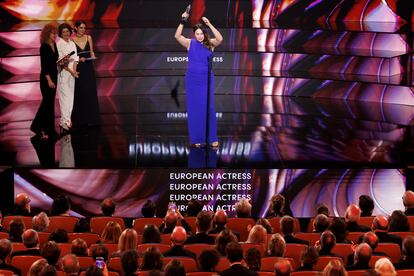
Pedro Almodóvar—in the city, although due to an illness he did not attend the ceremony in the auditorium on the shore of Lake Lucerne—is accompanying The next room on his European and American tour, where the awards season now begins, while pre-production of his new film has already started. Her first feature film shot in English competed in four categories (film, direction, script and actress), and came away empty-handed. The Spaniard had already won best film in previous editions with All about my mother y Talk to her.
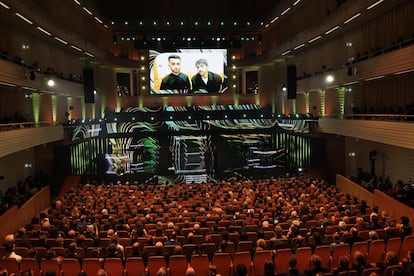
MICHAEL BUHOLZER (EFE)
Another of the films of the season, the documentary No Other Land, of the Israeli Yuval Abraham and the Palestinian Basel Adra, triumphed in its category. No Other Land He started his career, and his fight to have his message heard in favor of equality between the Palestinian and Israeli populations, at the last Berlinale. Since that premiere, its filmmakers have fought against, even, death threats. At the European cinema gala, its filmmakers entered by video call and asked the Europeans to be firm and quick in supporting the Palestinian people of Gaza. Also entering by video call was debutant Abou Sangare, best actor for The story of Souleymane, in which he plays a bicycle delivery food deliveryman and asylum seeker who has two days in Paris to prepare for an interview in which he will obtain, or not, legal residency.
In the category of best animated feature, in which Spain was also represented by The sultana’s dreamby Isabel Herguera, and by They shot the pianistby Fernando Trueba and Javier Mariscal, the favorite, the Latvian, won Flow, by Gints Zilbalodis, which sounds like it could even reach an Oscar nomination in its section. Last year he won here Robot Dreams, by Pablo Berger.
The technical sections, previously announced, were delivered in one go. The best photograph went to Benjamin Kračun for The substance; The best editing went to Juliette Welfling, for Emilia Pérez; the best production design went to Jagna Dobesz with The girl with the needle; the best costume went to Tanja Hausner for The Devil’s Bath; the best makeup and hairdressing was won by Evalotte Oosterop with When the Light Breaks; The best soundtrack went to Frederikke Hoffmeier, with The girl with the needle; The award for best sound went to the team of The story of Souleymane, and that of the special effects was in turn taken by the film team. The substance.
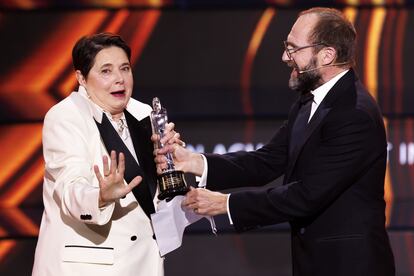
Among the rest of the awards, the three honorary ones stood out: Wim Wenders received a lifetime achievement award and expressed his gratitude that the new president of the United States will make European cinema shine even more; Isabella Rossellini – who was introduced by an exciting Ralph Fiennes – the European achievement in world cinema, and celebrated it with a speech in which she defended curiosity as a vital driving force and recalled that her parents were from the northernmost Europe and the southernmost; and the producer Labina Mitevska, the Eurimages for her work in the co-production.
By the way, another filmmaker with great ancestors, Halfdan Ullmann Tøndel, the grandson of Ingmar Bergman and Liv Ullmann, won with The tutoring the European discovery of the year award. The tutoring It is the first film by the Norwegian, who already won the Camera d’Or at Cannes last year.
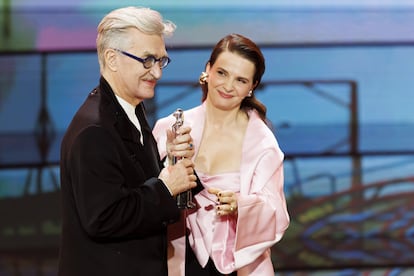
MICHAEL BUHOLZER (EFE)
The new president of the European Film Academy, the fourth in the history of an institution that has now exceeded 5,000 members, actress Juliette Binoche, began her speech by highlighting the shadows that surround and walk through Europe, and supporting the countries that suffer war conflicts on the continent or near it, before focusing on the purely cinematographic and the legacy she receives as the new person in charge.
Last year, the European ceremony highlighted the quality of another French film, Anatomy of a fall, by Justine Triet, which won the trophies for best film, direction, screenplay, editing and leading actress. Later, at the Oscars it was nominated in five categories and won the statuette for original screenplay.

